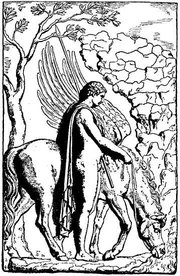Bellerophon
|
|
Bellerophon ("bearing darts") was a hero from Greek mythology whose greatest feat was to kill the Chimera, a monster usually depicted as with a lion's head, a goat's body, and a serpent-tail. He is also said to be the grandson of Sisyphus, a notable character in mythology who was sent to Tartarus for doing many evil things in life. He was the son of King Glaucus of Corinth.
Bellerophon's journey begins when he is acused of trying to seduce the wife of King Proteus. He is sent into to exile to the land of King Iobates of Lycia. Proteus wanted Iobates to kill Bellerophon, but Iobates feared the wrath of the gods if he murdered a guest; so he sent Bellerophon on a mission that Iobates deemed impossible: to kill the fire-breathing monster the Chimera.
An alternate version of the beginning of the quest is that Bellerophon wandered into Proteus, who grew intensely jealous of him. Proteus was the son-in-law of Iobates, King of Lycia, and sent Bellerophon to him with a sealed message that asked to kill Bellerophon, this is the origin of the expression a "bellerophonic letter". Lycia at the time was in the middle of a horrific plague and Iobates didn't want to strain the population with a war, which would surely be the result if he murdered Bellerophon. Instead, he sent him on an impossible quest: to kill the Chimera.
The goddess Athena, realizing Bellerophon would surely die if he undertook this task alone, sent him aid in the form of the winged horse, Pegasus. Alternatively, Bellerophon sought out the wisest man in Lycia, Polyidus, who told him about the Pegasus. To obtain the services of the winged horse, Polyidus told Bellerophon to sleep in the temple of Athena. While Bellerophon slept, he dreamed of Athena setting a golden bridle down beside him; it was there when he awoke. Bellerophon had to sneak up on Pegasus while it drank from a well (Polyidus told him which well -- Pirene on the Acrocotinth).
Bellerophon mounted his steed and flew off to where the Chimera was said to dwell. When he arrived, the Chimera was truly ferocious, and he could not harm the monster even while riding on Pegasus. He felt the heat of the breath the Chimera expelled, and was struck with an idea. He got a large block of lead and mounted it on his spear. He then flew head-on towards the Chimera, holding out the spear as far as he could. Before he broke off his attack, he managed to lodge the block of lead inside the Chimera's throat. The beast's fire-breath melted the lead, and blocked its air passage. The Chimera suffocated, and Bellerophon returned to King Iobates victoriously. Iobates was unable to believe that this valiant hero deserved death, and so he allowed Bellerophon to marry his daughter. Alternatively, Iobates' daughter, Antea, loved Bellerophon. He scorned her and she committed suicide. Iobates' other daughter, Philonoe, had an affair with Bellerophon.
However, as Bellerophon's fame grew, so did his ego. Bellerophon felt that, with Pegasus, he could fly to Mount Olympus, the realm of the gods. However, the flight was truly exhausting for Pegasus and the gods sent a fly to sting the horse. Pegasus stumbled and Bellerophon fell to his death, punished for the pride of hubris. (In some versions, Athena saves him but Pegasus flies away and Bellerophon is crippled by the fall.)
Bellerophon was also said to be the father of Laodamia by an unknown woman.
The Baroque opera Il Bellerofonte of the Czech composer Josef Myslivecek also derives its name from Bellerophon.
In the sci-fi story Forbidden Planet (both the novel by W.J. Stuart and the 1956 film starring Walter Pidgeon and Leslie Nielsen) the space cruiser C-57-D is sent to planet Altair IV to search for survivors of the ill-fated Bellerophon Expedition.cs:Bellerofontés da:Bellerofon de:Bellerophontes el:Βελλεροφόντης es:Belerofonte fr:Bellérophon it:Bellerofonte nl:Bellerophon ja:純文学 pl:Bellerofontpt:Belerofonte sl:Belerofont sv:Bellerofon

